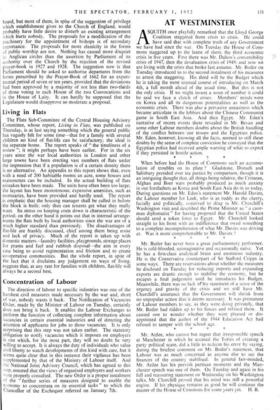AT WESTMINSTER
ASQUITH once playfully remarked that the Lloyd George Coalition staggered from crisis to crisis. He could have said that with complete truth of any Government we have had since the war. On Tuesday the House of Com- mons staggered up to the latest of them, the third economic crisis in five years. First there was Mr. Dalton's convertibility crisis of 1947, then the devaluation crisis of 1949, and now we are living with the crisis that broke last autumn. Mr. Butler on Tuesday introduced us to the second instalment of his measures to arrest the staggering. His third will be the Budget which he is taking the most unusual course of introducing on March 4th, a full month ahead of the usual time. But this is not the only crisis. If we might invent a noun of number it could be said we face a clutch of crises. Members' minds were on Korea and all its dangerous potentialities as well as the economic crisis. There was also a pervasive uneasiness which became articulate in the lobbies about the Chinese Communist game in South East Asia. And then Egypt. Mr. Eden's nattative of recent events there revealed in Mr. Bevan and some other Labour members doubts about the British handling of the conflict between our troops and the Egyptian police. Mr. Eden, however, knowing all the facts, seemed to still these doubts by the sense of complete conviction he conveyed that the Egyptian police had received ample warning of what to expect if they persisted in hostile action. * * * * When before had the House of Commons such an accumu- lation of troubles on its plate ? Gladstone, Disraeli and Salisbury presided over tea parties by comparison, though it is an intriguing thought that, all things being relative, the Crimean, Afghan and Boer wars probably produced as much anxiety in our forefathers as Korea and South East Asia do in us today. During questions on Mr. Eden's statement Mr. Harold Davies, the Labour member for Leek, who is as ruddy as the cherry, facially and politically, contrived to di'ag in Mr. Churchill's Washington visit and described the Prime Minister as "a cave- man diplomatist" for having proposed that the United States should send a token force to Egypt. Mr. Churchill looked straight to his front with an indifference that owed something to a complete incomprehension of what Mr. Davies was driving at. Was it more comprehensible to Mr. Davies ? * * * * Mr. Butler has never been a great parliamentary performer. He is cold-blooded, unimaginative and occasionally naïve. Yet he has a first-class analytical brain and enormous industry. He is the Conservative counterpart of Sir Stafford Cripps in some ways. There are reservations about whether the measures he disclosed on Tuesday for reducing imports and expanding exports are drastic enough to stabilise the economy, but he escapes a final judgement until he introduces his Budget. Meanwhile, there was no lack irf his statement of a sense of the urgency and gravity, _of the crisis and we still have Mr.
Churchill's assurance that the Government will shrink from no unpopular action that it deems necessary. It was premature of Labour members to say, as they were doing privately, that Mr. Butler had ridden up to his fences and refused them. It caused one to wonder whether they were pleased or dis- appointed that the author of the 1944 Education Act had refused to tamper with the school age. * * * * Mr. Attlee, who cannot but regret that irresponsible speech at Manchester in which he accused the Tories of creating a party political scare, did a little to redeem his error by saying, during the briefest comment on Mr. Butler's statement, that Labour was as much concerned as anyone else to see the finances of the country stabilised. In general fair-minded, Mr. Attlee has his peevish partisan moments and the Man- chester speech was one of them. On Tuesday and again in his full and reassuring statement on Wednesday on his Washington talks, Mr. Churchill proved that his mind was still a powerful engine. If his physique remains as good he will continue the master of the House of Commons for some years yet. H. B.


































 Previous page
Previous page